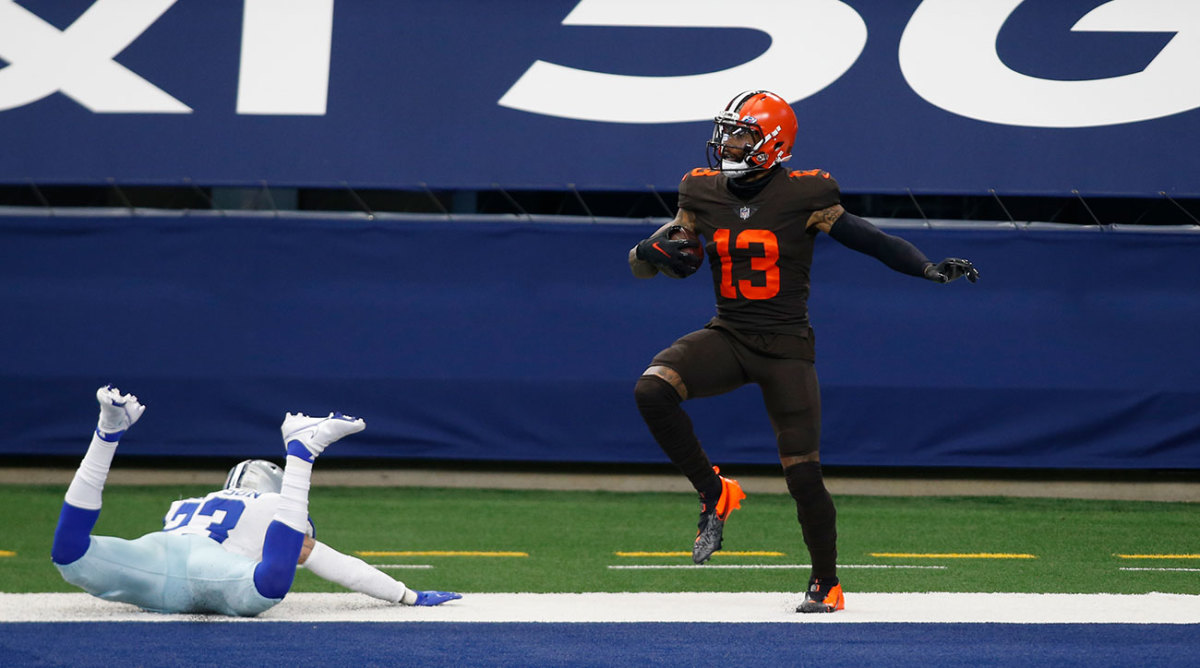The Browns Are Not Just Winning But Finally Looking Competent
It’s unclear at what point, during Sunday’s 49–38 win over the Cowboys, the Browns’ 3–1 start no longer seemed like a mirage.
Maybe it was the moment the Browns reached 28 points in a first half for the first time since the end of the Cold War (not a joke, by the way). Maybe it was when they took over the league lead in points off turnovers. Maybe it was when they emerged from halftime with a continuation of their functional, sensible game plan and shoved the ball down Dallas’s throat to go up 24 points—a lead they didn’t relinquish.
Maybe it was the combination of it all. In Week 4, we saw the Cleveland Browns doing things that traditionally well-structured teams tend to do. Playing well against other talented rosters. Thriving when star players go down (in this case Nick Chubb). Not erupting or falling apart at the first whiff of adversity.
The Cleveland Browns are, maybe, legitimate and, maybe for the first time since Bill Belichick was working their sidelines, it’s not just something people will say to fill vacant airtime or to elicit some cheap outrage clicks.

In the past, any of Cleveland’s recent success has been the equivalent of a sugar high: something that produces a very brief euphoria, ultimately leading to an unsatisfying and startling crash. This is what happens when the root of the problem is inherently unhealthy—a misaligned coach and front office, or a collection of skill-position players with no offensive line. The Browns have been rotting from the inside for 20 years now, with a rapid succession of power structures all coming in and failing to recognize that the entire operation needed to be ripped apart and hollowed before something could grow again.
During last offseason’s hiring cycle, the buzz among those in the industry was that Cleveland was hell bent on bringing in Kevin Stefanski from the moment they “opened” up the process. Other coaches went into interviews knowing they would have to conjure something magical to have even a distant chance. While the negative—a potentially not-so-subtle flouting of the Rooney Rule’s spirit, which has eroded the league’s minority coaching pipeline—was apparent to some, the positive for the Browns was that this was one of the few times they had gone into anything as an organization rowing in one direction. Hiring a coach who would fit the personnel. Drafting to fit the scheme. Things not typically seen in Cleveland.
This was a team in the past that could not say it was unified about anything. Those in charge couldn’t read their own quarterback scouting reports on draft day. They approached free agency like a pack of drunk Vegas vacationers playing tug of war with the battle plan. They outthought themselves countless times, leaving the important processes to be solved by both everyone and no one at once.
While it’s impossible to say that all of this has been fixed through four weeks of the weirdest football season in modern NFL history, it is safe to say that, by now, we have a feel for the dividing line between dysfunction and function around the league. Cleveland’s opponent on Sunday, Dallas, is struggling. In Philadelphia and New York (both franchises) there is something broken underneath the surface that needs a correction.
In Cleveland, for the first time in who knows how long, they are not sitting in panic mode among those without an answer.
With six minutes to go on Sunday, a frantic Cowboys comeback effort had compressed Cleveland’s lead to 11 points. Baker Mayfield sailed a throw over the head of a wide-open Odell Beckham and the ensuing punt seemed to shank off the foot of Jamie Gillian. Dak Prescott completed a series of darts downfield, Amari Cooper juked his way out of about a dozen tackles and CeeDee Lamb caught one of the least-contested fade routes we’ve seen in recent memory. A reverse flip to Cooper on the two-point conversion put the Cowboys within a field goal.
But then … the Browns didn’t lose. The familiar charge of public, out-loud failure faded with the help of a reverse run to Odell Beckham, who had nearly 150 yards of total offense and three touchdowns on Sunday. This was a game the Browns would have given away in the past, 10 times out of 10. This is when we’d normally start talking about curses and ineptitude and the whole cyclical process of failure again.
Now, we’re talking about something being built. Imagine that.
